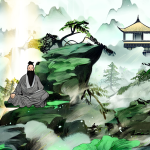《寒窑赋》原文

天有不测风云,人有旦夕祸福。蜈蚣百足,行不及蛇;雄鸡两翼,飞不过鸦。马有千里之程,无骑不能自往;人有冲天之志,非运不能自通。
盖闻:人生在世,富贵不能淫,贫贱不能移。文章盖世,孔子厄于陈邦;武略超群,太公钓于渭水。颜渊命短,殊非凶恶之徒;盗跖年长,岂是善良之辈。尧帝明圣,却生不肖之儿;瞽叟愚顽,反生大孝之子。张良原是布衣,萧何称谓县吏。晏子身无五尺,封作齐国宰相;孔明卧居草庐,能作蜀汉军师。楚霸虽雄,败于乌江自刎;汉王虽弱,竟有万里江山。李广有射虎之威,到老无封;冯唐有乘龙之才,一生不遇。韩信未遇之时,无一日三餐,及至遇行,腰悬三尺玉印,一旦时衰,死于阴人之手。
有先贫而后富,有老壮而少衰。满腹文章,白发竟然不中;才疏学浅,少年及第登科。深院宫娥,运退反为妓妾;风流妓女,时来配作夫人。青春美女,却招愚蠢之夫;俊秀郎君,反配粗丑之妇。蛟龙未遇,潜水于鱼鳖之间;君子失时,拱手于小人之下。衣服虽破,常存仪礼之容;面带忧愁,每抱怀安之量。时遭不遇,只宜安贫守份;心若不欺,必然扬眉吐气。初贫君子,天然骨骼生成;乍富小人,不脱贫寒肌体。
天不得时,日月无光;地不得时,草木不生;水不得时,风浪不平;人不得时,利运不通。注福注禄,命里已安排定,富贵谁不欲?人若不依根基八字,岂能为卿为相?
吾昔寓居洛阳,朝求僧餐,暮宿破窖,思衣不可遮其体,思食不可济其饥,上人憎,下人厌,人道我贱,非我不弃也。今居朝堂,官至极品,位置三公,身虽鞠躬于一人之下,而列职于千万人之上,有挞百僚之杖,有斩鄙吝之剑,思衣而有罗锦千箱,思食而有珍馐百味,出则壮士执鞭,入则佳人捧觞,上人宠,下人拥。人道我贵,非我之能也,此乃时也、运也、命也。
嗟呼!人生在世,富贵不可尽用,贫贱不可自欺,听由天地循环,周而复始焉。
中文翻译
天上有预测不到的风云变幻,人也会有早晚遇到的灾祸与喜事。蜈蚣有上百只足,但却不如蛇行走得好;家鸡翅膀虽然很大,却不能像鸟一样飞行。马虽然能行走千里之遥,但没有人驾驭也不能自己到达目的地;人有远大的理想,但缺乏机遇就不能实现。
人们常说:人生在世,富贵不能骄奢淫逸,贫贱不能动摇心志。孔子的文章写得超过世人却被围困于陈国;文韬武略超群的姜子牙也曾在渭水垂钓等待机会。颜回虽然早亡,但绝非凶恶的人;盗跖虽然活得长,却不是善良人。尧、舜虽然英明,却生下不肖的儿子;瞽叟顽固愚昧,反而生下大孝子。张良原来只是普通百姓,萧何也只是县吏。晏子的身高不到五尺,却被封为齐国宰相;孔明居住在茅草屋里,却能担当蜀国的军师。项羽虽然强大,却兵败而自刎乌江;刘邦虽然弱小,最终掌管天下江山。李广虽有射虎石的威名,却终身都未获得封侯;冯唐虽有治国安邦的才能,却一生怀才不遇。韩信时运不济时,连饭都吃不上,等到运气来了,成为掌印的大将军,而一旦运气衰败,又死于阴毒人的计谋。
有的人先贫穷后富裕,也有人老年壮志未酬而少年却已衰败。满腹锦绣文章,直到老年还没有考上功名;才疏学浅的人,可能很年轻就金榜题名。皇城深宫中的妃娥,在运道不好时可能沦为妾妓;而风流的妓女,时来运转也能做贵夫人。青春美丽的女子嫁了愚蠢的丈夫,俊秀的青年倒找了丑陋的妻子。蛟龙没有机遇,只能藏身于鱼鳖之间;君子没有机会时,只能向小人屈从。衣服虽然破旧,常保持恭敬礼仪;面带忧愁却可能怀有兼济天下的志向。不得志时,只能安于贫穷和本分;心中坦荡,必然会扬眉吐气。初贫君子,天然骨格生成;乍富小人,不脱贫寒肌体。
天气不好时,就见不到太阳和月亮的光辉;土地没有合适的气候条件时,草木都不会生长;水得不到恰当的环境时,就会掀起疾风巨浪;人若得不到机遇时,好运就不畅通。福禄富贵,命中都有安排,谁不想要呢?人如果没有依从根基八字而生活,哪里能做高官当宰相呢?
我过去在洛阳,白天到寺庙里吃斋饭,晚上住在寒冷的窑洞里。所穿衣服不能避寒,吃的粥饭抵御不了饥饿。上等人憎恨我,下等人讨厌我,都说我卑贱,是我没有机遇啊。现在我入朝为官,官职做到最高层,地位达到三公,地位只在皇帝一人之下,千万人之上,拥有管理百官的权利,有惩罚卑鄙悭吝官员的权力。穿衣服是绫罗锦缎,吃的则是山珍海味,出门有武士保护,回家有仆人侍奉,皇上宠爱我,百官拥戴我,所有的人说我尊贵,不是我真有多大本领,这是我得到天时和命运的眷顾啊。
唉!人生在世,发达富贵的时候不能只图享用,贫贱的时候也不要自暴自弃,听从天地的循环和周而复始的变化吧!
英文翻译
There are unpredictable changes in the weather, and people may encounter unexpected joys and sorrows at any time. A centipede has hundreds of feet, yet it cannot walk as fast as a snake; a rooster has two wings, but it cannot fly as high as a crow. A horse can travel thousands of miles, but without a rider, it cannot reach its destination on its own; a person may have lofty aspirations, but without good fortune, they cannot be realized.
It is often said that in life, one should not be indulgent in wealth and honor, nor should one be shaken by poverty and low status. Confucius, whose literary works surpassed those of others, was trapped in the State of Chen; Jiang Ziya, who was outstanding in both civil and military affairs, once fished by the Wei River waiting for an opportunity. Yan Hui died young, but he was by no means an evil person; Dao Zhi lived a long life, yet he was not a kind-hearted man. Yao and Shun were wise and saintly emperors, but they had unworthy sons; Gou Shi was stubborn and ignorant, yet he had a filial son. Zhang Liang was originally an ordinary commoner, and Xiao He was just a county official. Yan Ying was less than five feet tall, but he was appointed as the prime minister of the State of Qi; Zhuge Liang lived in a thatched cottage, yet he became the military advisor of the Shu Han Kingdom. Xiang Yu was powerful, but he committed suicide by the Wu River after his defeat; Liu Bang was relatively weak, but he eventually ruled over the vast territory of the country. Li Guang had the reputation of being able to shoot tigers, but he was never granted a noble title throughout his life; Feng Tang had the talent to govern the country, but he was never given the chance to show his abilities all his life. When Han Xin was out of luck, he couldn't even afford three meals a day. Once he got the opportunity, he became a general with a jade seal hanging from his waist. However, when his luck faded, he was killed by a treacherous person.
Some people become rich after being poor, while some become weak in old age after being strong in their youth. A person who is full of literary talent may not pass the imperial examinations until he is old; a person with little knowledge and shallow learning may pass the examinations and become an official when he is young. Imperial concubines in the deep palace may become prostitutes when they are out of favor; while prostitutes may become noble ladies when fortune smiles on them. A beautiful young girl may marry a stupid husband, while a handsome young man may marry an ugly woman. A dragon without an opportunity can only hide among fish and turtles; a gentleman without a chance can only submit to villains. Even if one's clothes are tattered, one should always maintain a dignified appearance; even if one has a worried look on one's face, one should have the ambition to bring peace and prosperity to the world. When one is not successful, one should be content with poverty and stick to one's principles; when one's heart is not deceived, one will surely be able to hold one's head high. A gentleman who is poor at first has a natural and noble character; a villain who becomes rich suddenly still retains the appearance of poverty.
When the weather is bad, the sun and the moon do not shine; when the land does not have suitable climatic conditions, plants do not grow; when water does not have the right environment, it will stir up fierce winds and huge waves; when a person does not have opportunities, good fortune will not come. Fortune, wealth, and high - ranking positions are all pre - arranged by fate. Who doesn't want them? If a person does not follow the foundation of their birth - chart and live accordingly, how can they become high - ranking officials and prime ministers?
In the past, I lived in Luoyang. In the morning, I went to the temple to beg for food, and at night, I slept in a cold cave. The clothes I wore could not keep me warm, and the porridge I ate could not satisfy my hunger. People of high status despised me, and people of low status disliked me. Everyone said I was lowly, but it was because I lacked opportunities. Now I have entered the court and become an official. My official position has reached the highest level, and I hold the position of one of the Three Ducal Ministers. Although I am only below the emperor, I am above thousands of officials. I have the power to manage all the officials and the authority to punish corrupt and stingy officials. I wear silk and brocade clothes and eat delicacies from all over the world. When I go out, I am protected by bodyguards; when I come back, I am served by maids. The emperor favors me, and all the officials support me. Everyone says I am noble, but it is not because I have great abilities. It is because I have received the favor of timing and fate.
Alas! In life, when one is rich and noble, one should not just enjoy oneself; when one is poor and low - status, one should not be self - deprecating. Just follow the cycle of heaven and earth and its continuous repetition.
背景补充
《寒窑赋》传为北宋宰相吕蒙正所作。吕蒙正出身贫寒,早年生活极为困苦,曾与母亲住在洛阳城东的破窑之中,靠乞讨为生。但他勤奋好学,胸怀大志,最终通过科举考试进入仕途,官至宰相。
这篇赋是吕蒙正为了劝诫太子而创作的。当时太子(后来的宋真宗)年轻气盛,听不进逆耳之言,吕蒙正便写了《寒窑赋》呈给他。在赋中,吕蒙正以自己的人生经历为蓝本,结合历史上诸多人物的兴衰沉浮,阐述了人生富贵贫贱无常、皆由天命和时运决定的观点。他旨在让太子明白,无论处于何种境地,都应保持平和的心态,不可因一时的得意而骄傲自满,也不可因暂时的困境而一蹶不振。同时,也表达了一种顺应天命、安贫乐道、积极进取的人生态度。《寒窑赋》以其深刻的哲理、生动的事例和质朴的语言,流传甚广,对后人的思想和行为产生了深远的影响。不过,也有学者认为《寒窑赋》并非吕蒙正所作,但目前并无确凿定论。












评论功能已关闭。